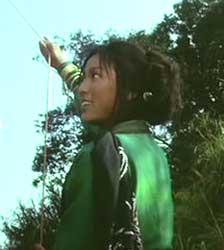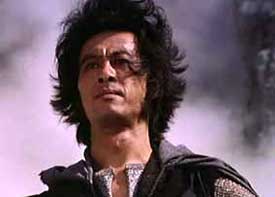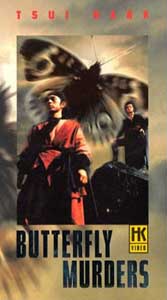I saw The Butterfly Murders (Die bian, 1979) for the first time when it was brand spanking new, when it played at the Seattle International Film Festival.
At the time it was not well-attended, & it was not favorably reviewed. Tsui Hark's quick-cut comic-book style of Butterfly Murders did not settle well with most viewers on the international film circuit in 1980, due in part to the silly subtitles that only we die-hards have gotten used to, & the fact that these subtitles weren't on the screen long enough to be fully read. It has since fared a bit better on dvd for which anything missed might be replayed at the viewer's whim.
 The tale included an exciting though unbelievable rope-fighting & rope-flying super-heroine played by Michelle Mee. She created a charming character but one who was a bit of a spaz & ultimately does herself in being inappropriately & ineptly heroic. I think it may have been the first time Michelle Mee made a lasting impression on me, whether for better or worse. The tale included an exciting though unbelievable rope-fighting & rope-flying super-heroine played by Michelle Mee. She created a charming character but one who was a bit of a spaz & ultimately does herself in being inappropriately & ineptly heroic. I think it may have been the first time Michelle Mee made a lasting impression on me, whether for better or worse.
Butterfly Murders was undeniably colorful & even to a degree "new" in its editing style & comic book "look" & it made Vietnam-born Tsui Hark a practical overnight sensation as a director in Asia. His career was off at full tilt, & lo these twenty-some years later, his is one of the most familiar names even in the west for Hong Kong action.
A description of the convoluted murder mystery imbedded in the film would make it sound even dumber than it is. Many a wuxia is just wildly convoluted & silly in its plot, but Tsui Hark at least knows it's silly, & seems partially to be spoofing just such needless complexity & amping it up to even higher absurdity.
The visuals & action are ultimately all that matter. The good guys are distinct from the bad guys less for their behavior than for the color of their costumes, an ornate throwback to White Hat/Black Hat distinctions. Such whimsically gruesome content as the flesh-eating butterflies trick out the tale for sake of grins & gawps, & any novice viewer of Chinese costume epics' or wuxia's campier material will be roundly amazed.
 Tsui has been declared a leading member of the "New Wave" wuxia of the 1980s, a terrible name for any alleged movement, but one that holds it distinct from "Old School" kung fu of the 1960s & 1970s. Tsui has been declared a leading member of the "New Wave" wuxia of the 1980s, a terrible name for any alleged movement, but one that holds it distinct from "Old School" kung fu of the 1960s & 1970s.
As I'm most enamored of the more serious & down-to-earth sorts of martial arts films, such as exemplified by King Hu in Hong Kong & Akira Kurosawa in Japan, the far-reaching influence of Tsui Hark is something I could easily regard as harmful.
And while Tsui's cinematographer for Butterfly Murders is frequently praised for the wild variety of camera angles & tricks, I find this inability to settle down & tell a story to be less pyrotechnic than it is just immature, as if the cinematographer were yelling "Look what I can do!" to his mommy because he's standing on his head.
But it's hardly Tsui Hark's fault he's imitated by so many studio directors. And much that he's been credited with starting had already been done by old-school directors, in for example the zombie kung-fu flicks Finger of Doom (Tai yin zhi, 1971) directed by Hsueh Li Pao & The Crimson Charm (Xie fu men, 1971) directed by Feng Huang, & fantasies like The Magic Blade (Tien ya ming yueh dao, 1976) directed by Yuen Chor, or The Battle Wizard (Tian long ba bu, 1977) again by Hsueh Li Pao.
Tsui Hark's own work judged on its own merits is among the best of the campier sorts of films to blend kung fu action with fantasy/supernatural events, more sword & sorcery director than kung fu. And Butterfly Murders can be viewed almost as a preliminary version of Tsui's greatest over-the-top heroic fantasy film, Legend of Zu (Shu shan zheng shuan, 2001).
copyright © by Paghat the Ratgirl
|

 The tale included an exciting though unbelievable rope-fighting & rope-flying super-heroine played by Michelle Mee. She created a charming character but one who was a bit of a spaz & ultimately does herself in being inappropriately & ineptly heroic. I think it may have been the first time Michelle Mee made a lasting impression on me, whether for better or worse.
The tale included an exciting though unbelievable rope-fighting & rope-flying super-heroine played by Michelle Mee. She created a charming character but one who was a bit of a spaz & ultimately does herself in being inappropriately & ineptly heroic. I think it may have been the first time Michelle Mee made a lasting impression on me, whether for better or worse. Tsui has been declared a leading member of the "New Wave" wuxia of the 1980s, a terrible name for any alleged movement, but one that holds it distinct from "Old School" kung fu of the 1960s & 1970s.
Tsui has been declared a leading member of the "New Wave" wuxia of the 1980s, a terrible name for any alleged movement, but one that holds it distinct from "Old School" kung fu of the 1960s & 1970s.